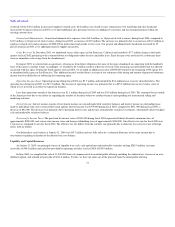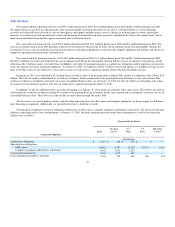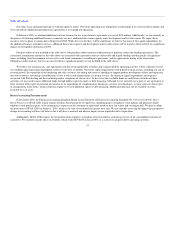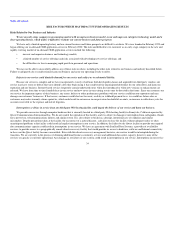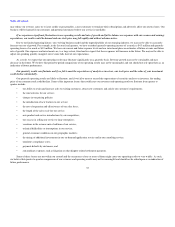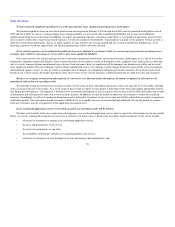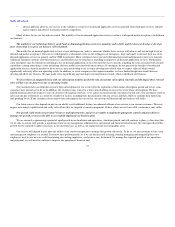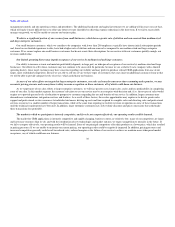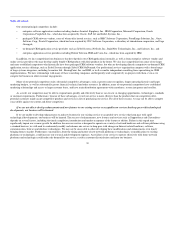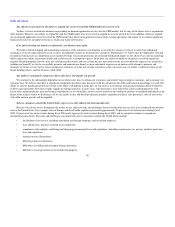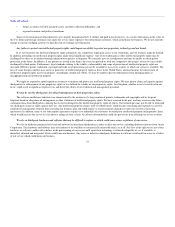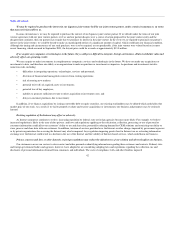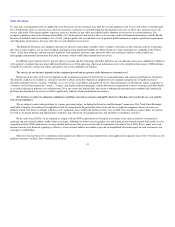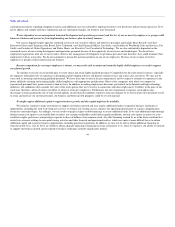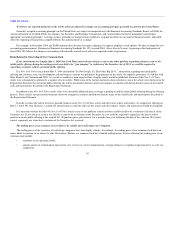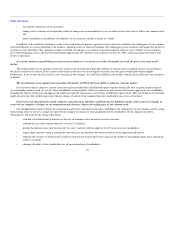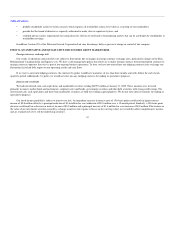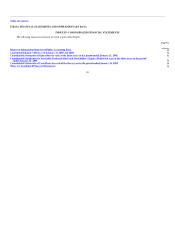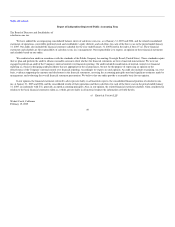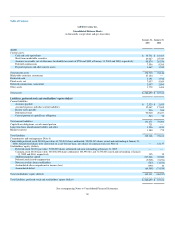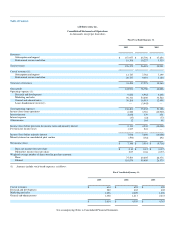Salesforce.com 2004 Annual Report Download - page 45
Download and view the complete annual report
Please find page 45 of the 2004 Salesforce.com annual report below. You can navigate through the pages in the report by either clicking on the pages listed below, or by using the keyword search tool below to find specific information within the annual report.
Table of Contents
• longer accounts receivable payment cycles and other collection difficulties; and
• regional economic and political conditions.
Some of our international subscription fees are currently denominated in U.S. dollars and paid in local currency. As a result, fluctuations in the value of
the U.S. dollar and foreign currencies may make the service more expensive for international customers, which could harm our business. We do not currently
engage in currency hedging activities to limit the risk of exchange rate fluctuation.
Any failure to protect our intellectual property rights could impair our ability to protect our proprietary technology and our brand.
If we fail to protect our intellectual property rights adequately, our competitors might gain access to our technology, and our business might be harmed.
In addition, defending our intellectual property rights might entail significant expense. Any of our trademarks or other intellectual property rights may be
challenged by others or invalidated through administrative process or litigation. We currently have no issued patents and may be unable to obtain patent
protection in the future. In addition, if any patents are issued in the future, they may not provide us with any competitive advantages, or may be successfully
challenged by third parties. Furthermore, legal standards relating to the validity, enforceability and scope of protection of intellectual property rights are
uncertain. Effective patent, trademark, copyright and trade secret protection may not be available to us in every country in which our service is available. The
laws of some foreign countries may not be as protective of intellectual property rights as those in the United States, and mechanisms for enforcement of
intellectual property rights may be inadequate. Accordingly, despite our efforts, we may be unable to prevent third parties from infringing upon or
misappropriating our intellectual property.
We might be required to spend significant resources to monitor and protect our intellectual property rights. We may initiate claims or litigation against
third parties for infringement of our proprietary rights or to establish the validity of our proprietary rights. Any litigation, whether or not it is resolved in our
favor, could result in significant expense to us and divert the efforts of our technical and management personnel.
We may be sued by third parties for alleged infringement of their proprietary rights.
The software and Internet industries are characterized by the existence of a large number of patents, trademarks and copyrights and by frequent
litigation based on allegations of infringement or other violations of intellectual property rights. We have received in the past, and may receive in the future,
communications from third parties claiming that we have infringed on the intellectual property rights of others. Our technologies may not be able to withstand
any third-party claims or rights against their use. Any intellectual property claims, with or without merit, could be time-consuming and expensive to resolve,
could divert management attention from executing our business plan and could require us to pay monetary damages or enter into royalty or licensing
agreements. In addition, many of our subscription agreements require us to indemnify our customers for third-party intellectual property infringement claims,
which would increase the cost to us of an adverse ruling on such a claim. An adverse determination could also prevent us from offering our service to others.
We rely on third-party hardware and software that may be difficult to replace or which could cause errors or failures of our service.
We rely on hardware purchased or leased and software licensed from third parties in order to offer our service, including database software from Oracle
Corporation. This hardware and software may not continue to be available on commercially reasonable terms, or at all. Any loss of the right to use any of this
hardware or software could result in delays in the provisioning of our service until equivalent technology is either developed by us, or, if available, is
identified, obtained and integrated, which could harm our business. Any errors or defects in third-party hardware or software could result in errors or a failure
of our service which could harm our business.
41


